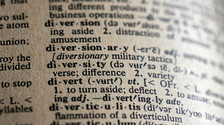Robson Leonel Branco
Follow the following phrase:
I think that's important to understand that is precisely the reason "by which" the President came to this decision.
Can I replace "by which" with " for which? Are they the same?
Sep 12, 2024 4:07 PM
Answers · 8
1
I agree with Dan. You can either talk about WHY the president came to the decision, or you can talk about HOW he came to the decision. "Reason by which" confuses these two issues.
WHY:
"the reason why he came to this decision"
HOW:
"the reasoning by which he came to this decision"
or, better,
"the reasoning that led him to this decision"
Sep 12, 2024 10:01 PM
1
This sentence has poor grammar in many ways.
I would change the start to:
"I think it's important to understand, that's precisely..."
Next, if we're saying "the reason", it would be better as "the reason why..."
If we're saying "by which", it would be better as "the reasoning by which..."
We can also say "the logic with which..." or "the rationale via which..." or "the end goal for which..."
Also, "the president" doesn't need capitalising. The capitalisation is only needed when you're naming him, such as "the reason why President Bush..."
Sep 12, 2024 6:31 PM
Yes
Sep 16, 2024 7:27 PM
No, "by which" and "for which" are not the same and can't be used interchangeably in your sentence.
* "By which" refers to the method or means through which something happens.
* "For which" refers to the reason or purpose for something.
In your sentence, "by which" implies the process or means the President used to come to the decision. If you use "for which," it would shift the focus to the reason for the decision, which changes the meaning.
In this context, "by which" is more appropriate.
Sep 13, 2024 1:52 PM
Still haven’t found your answers?
Write down your questions and let the native speakers help you!
Robson Leonel Branco
Language Skills
English, Portuguese
Learning Language
English
Articles You May Also Like

Top 6 Mistakes to Avoid with Vocabulary Acquisition
50 likes · 15 Comments

Navigating Your First Job: Do's and Don'ts in the Workplace
48 likes · 21 Comments

What Content to Watch to Acquire Advanced-level Proficiency
82 likes · 51 Comments
More articles
